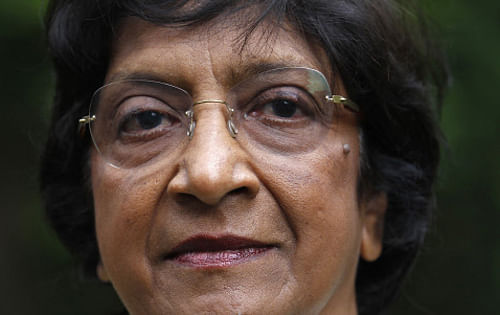
UN rights chief Navi Pillay today vowed to raise human rights concerns with the Sri Lankan leadership as she arrived here on a week-long visit to begin a fact-finding mission on the alleged war crimes by the military during the nearly three-decade-long conflict with the LTTE.
"I am not here to criticise. I've come to raise human rights concerns," she told reporters as she began her first meeting with local UN staff in Colombo.
Pillay, who is on her first visit to Sri Lanka, said she has framed herself "within the human rights standards set by the whole world inlcuding the government of Sri Lanka".
"I am not writing my own statute, I am looking at the frame work that was also developed by Sri Lanka. If I raise criticism, it is on whether they (Sri Lanka) comply with those standards," Pillay said.
Her visit came after the Sri Lankan government, already under pressure from Canada for a boycott of a Commonwealth summit here in November, dropped public hostility towards her and promised access to former war zones.
A South African national of Indian Tamil origin, Pillay will meet President Mahinda Rajapaksa and travel to former war zones in the northern and eastern provinces during her visit.
She will also hold interaction with politicians and rights groups, senior judicial figures, members of the National Human Rights Commission and the committee monitoring the National Plan of Action on the recommendations of the Lessons Learnt Reconciliation Commission.
"When I go back I would be reporting to the Human Rights Council," Pillay said.
The UN official will provide a first hand assessment on Sri Lanka at the September session of the UN Human Rights Council. She will provide a full formal report in March 2014, in accordance with the resolution adopted by the Council earlier this year.
Pillay said she had delayed her visit despite a government invitation until Sri Lanka presented the report of its Lesson Learnt and Reconciliation Commission (LLRC).
Her visit came following two succesive UNHRC resolutions on Sri Lanka moved by US and backed by India. Both resolutions urged Sri Lanka for expeditious implementation of the LLRC recommendations as means of achieving reconciliation with the Tamil minority.
Sri Lankan government's nationalist allies charge that Pillay was part of a sinister Western conspiracy to undermine the country.
As many as 40,000 people were reportedly killed in the last months of the conflict between Sri Lankan troops and the LTTE rebels fighting for an independent homeland. The war ended in 2009.
Deccan Herald is on WhatsApp Channels| Join now for Breaking News & Editor's Picks